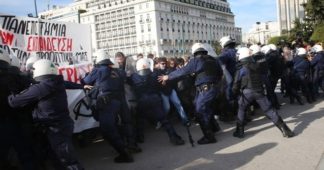Jacob PoushterMaria SmerkovichMoira Fagan Andrew Prozorovsky
Apr 24, 2025
In 35 countries, we asked respondents how free the media are to report the news in their country, how free people are to say what they want, and how free people are to use the internet.
- Majorities in many of the countries surveyed say media, speech and the internet are at least somewhat free of state or government censorship.
- A 50% median globally say people in their country are completely free to use the internet. Substantially fewer say people in their country are completely free to say what they want (31% median) and that the media are completely free to report the news (28% median).
- Compared with people in other countries, Latin Americans are less likely to say they have these freedoms.
- People’s perceptions of these freedoms are strongly linked with views of how democracy is working in their country. In most countries, those who characterize their press, speech and internet use as free are more likely to say they are satisfied with the functioning of their democracy.
- In many countries, supporters of the political party in power are more likely to say that media, speech and the internet are completely free in their country. It’s important to note that many political changes have occurred since we fielded the global survey in spring 2024, so attitudes may have shifted since then.
Freedom of the press
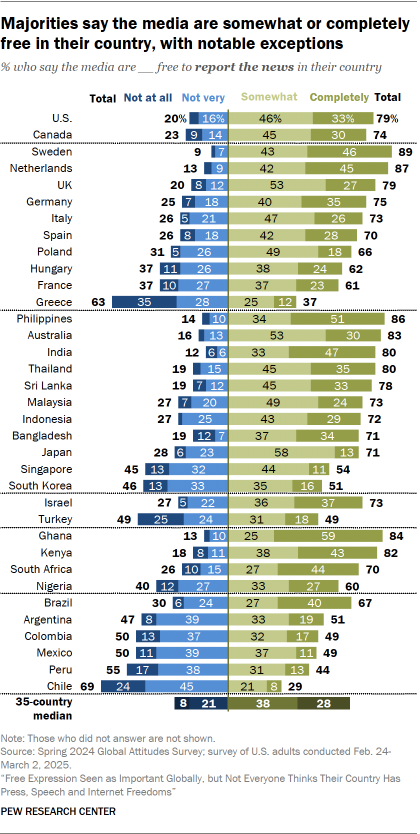
A median of 28% across 35 countries say the media are completely free to report the news in their country. Another 38% think the media are somewhat free.
In the U.S. and Canada, large majorities believe the media are at least somewhat free, although only about one-third of adults in each country say the media are completely free.
Majorities in most of the European countries surveyed see the media as free. Greece is a stark exception: A majority of people there say Greek media are not free to report the news, including 35% who say the media are not at all free. On the other end of the spectrum, nearly nine-in-ten Swedes say their media are at least somewhat free, including 46% who characterize the Swedish press as completely free.
In the Asia-Pacific region, the perception of free media is most common in Australia and the Philippines. But in Singapore and South Korea, opinions are more split: About half or more in each country say their media are completely or somewhat free to report the news, while 46% in South Korea and 45% in Singapore say the media are not very or not at all free.
In all four sub-Saharan African countries polled, majorities rate their media as free, including 59% in Ghana who say their media are completely free. Opinions are more divided in Nigeria than elsewhere in the region.
Negative perceptions of press freedom are common in most of the Latin American countries surveyed, especially Chile. Roughly seven-in-ten Chileans (69%) say the media are not very or not at all free to report the news. And opinions are divided in Argentina, Colombia, Mexico and Peru.
Views by support for governing parties
At the time the survey was fielded in spring 2024, people who supported the active governing party were often more likely than nonsupporters to characterize their country’s media as completely free. This was the case in 27 countries.
In Turkey, four-in-ten adults who support the government of President Recep Tayyip Erdoğan say the Turkish media are completely free to report the news. This compares with only 7% of those who do not support Erdoğan’s government – a difference of 33 points.
Similar divides on this question are found between supporters and nonsupporters of the governing parties in Hungary, India and Israel (24, 22 and 22 points, respectively).
Views of democracy by perceptions of press freedom
In 27 countries, people who say the media are completely free to report the news in their country are more likely to say they are very or somewhat satisfied with the way their democracy is working, compared with those who characterize the media as less free.
In Turkey, those who say media reporting is completely free are more 54 points more likely than those who say it is not completely free to be satisfied with their democracy (77% vs. 23%). Similar differences are found in Hungary, Germany and Canada (37, 34 and 30 points, respectively).
Freedom of speech
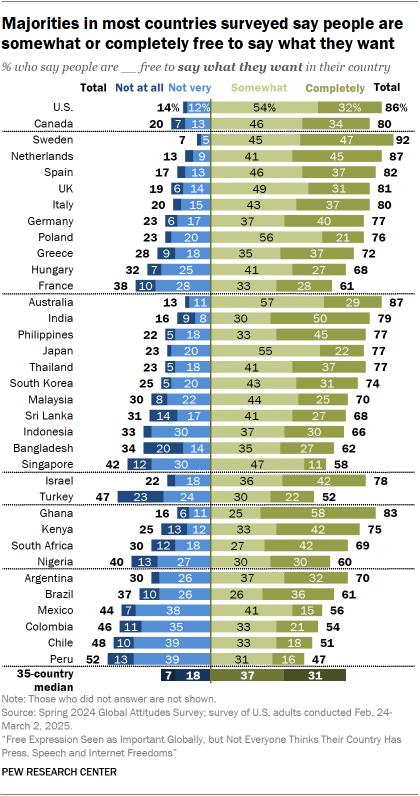
A median of 31% across 35 countries say people in their country are completely free to say what they want, with 37% saying people are somewhat free to do this.
Among Americans and Canadians, eight-in-ten or more believe people in their country are at least somewhat free to say what they want. And about a third of adults in each say speech is completely free.
In Europe, 92% of Swedes say that people are free to say what they want, including 47% who say they are completely free. By comparison, a much smaller majority of adults in France (61%) say people are free to say what they want.
Majorities in every Asia-Pacific country surveyed say people are at least somewhat free to express themselves, although the sentiment that speech is completely free is most widespread in India (50%) and the Philippines (45%).
Singapore again stands out, with only 11% saying speech is completely free and 42% saying it is not at all or not very free.
In the Middle East-North Africa region, around eight-in-ten adults in Israel (78%) say people are at least somewhat free to say what they want in their country. Views are more pessimistic in Turkey, where nearly half (47%) say speech is either not very or not at all free.
And in the sub-Saharan African countries surveyed, majorities characterize speech as free – especially in Ghana, where 58% say speech is completely free.
In Latin America, views of free speech are more divided. Majorities of Argentines, Brazilians and Mexicans say people are at least somewhat free to say what they want in their country. But opinions are split in Chile and Peru, where around half say people are not at all or not very free to say what they want.
In the U.S., we asked this question in both 2024 and 2025. In the past year, the share of Americans who say people in the U.S. are completely free to say what they want has gone up by 4 points, from 28% to 32%.
Views of democracy by perceptions of free speech
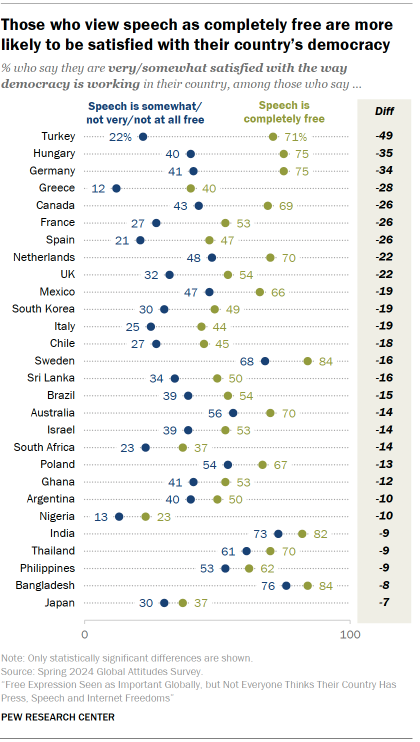
In 28 countries, those who say people are completely free to say what they want are more likely to say they are very or somewhat satisfied with the way their democracy is working, compared with those who characterize speech as less free.
For example, in Turkey, 71% of those who say speech is completely free also say they are satisfied with their country’s democracy. Only 22% of those who say speech is somewhat, not very or not at all free share the same satisfaction.
Freedom on the internet
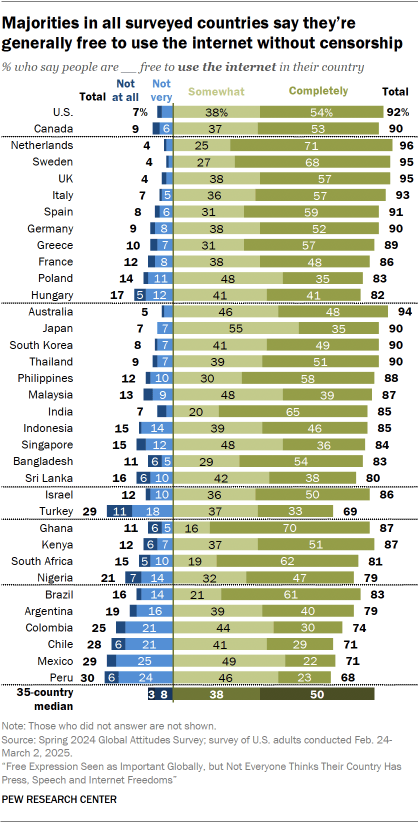
Majorities in all 35 countries surveyed say that people in their country are at least somewhat free to use the internet without censorship. A median of 50% say they have complete internet freedom.
In 22 of 35 countries, about half of adults or more say people are completely free to use the internet. These shares are highest in Ghana, India, the Netherlands and Sweden, where around two-thirds or more hold this view.
Confidence in internet freedom is high across all regions included in the survey, but comparatively lower in the Latin American countries. For example, a quarter of adults or more in Chile, Colombia, Mexico and Peru say their internet use is not very or not at all free from censorship.
In Turkey, 29% say internet freedom is limited, including 11% who say it is not at all free.
In all 35 countries, those who say internet use is completely free are more likely to say the same about press freedom and freedom of speech.
We asked Americans about freedom on the internet in both 2024 and 2025. As of this year, just over half (54%) say people in the U.S. have complete freedom on the internet– a 14-point increase from 2024 (40%). Among Republicans and Republican-leaning independents, there was a 25-point increase in this share since 2024.
Views by social media use
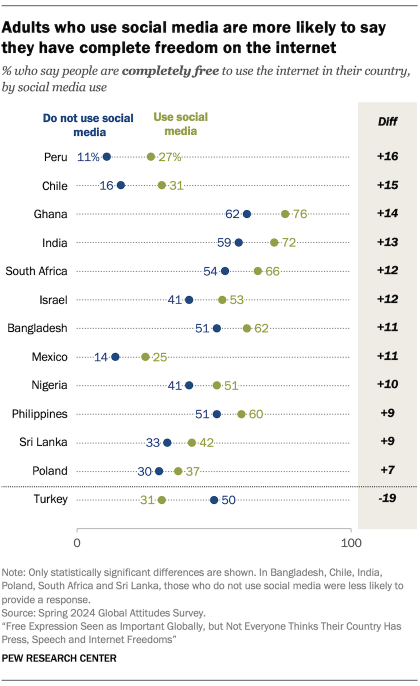
In 13 countries, there are significant differences between those who use social media and those who do not in perceptions of internet freedom. (We only asked about social media use in 20 mostly middle-income countries.)
In all these countries except Turkey, people who use social media are more likely than non-users to say they have complete internet freedom in their country. These differences are most common in sub-Saharan Africa and southern Asia.
Views of democracy by perceptions of internet freedom
In 25 countries surveyed, those who say people in their country can use the internet completely free of censorship are more likely to be very or somewhat satisfied with their democracy, compared with those who characterize internet use as less free. The biggest differences are found in Canada, Germany, the Netherlands and Turkey.
We remind our readers that publication of articles on our site does not mean that we agree with what is written. Our policy is to publish anything which we consider of interest, so as to assist our readers in forming their opinions. Sometimes we even publish articles with which we totally disagree, since we believe it is important for our readers to be informed on as wide a spectrum of views as possible.



